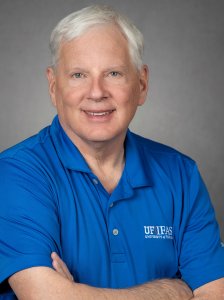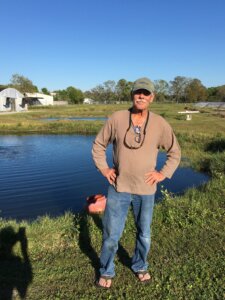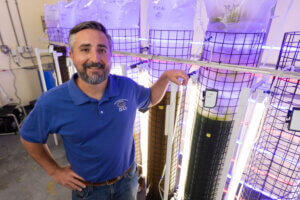April 2023 FloridAgriculture eNewsletter
 By J. Scott Angle
By J. Scott Angle
[email protected]
@IFAS_VP
Craig Watson is an icon in Florida aquaculture. He didn’t create the tropical fish industry in Florida. But he helped build it into a community. Farm Bureau was there from the beginning. Thirty years ago, the industry sought a scientific hub. Watson was an Extension agent serving as technical adviser to the Florida Farm Bureau Aquaculture Advisory Committee, and he asked its farmer members (including Marty Tanner, who today is its chair) and FFBF staff member Kevin Morgan (now retired) to advocate for the funding to build and staff what became the UF/IFAS Tropical Aquaculture Lab in Ruskin (TAL).
 TAL started with Watson, a veterinarian, a wildlife specialist and a secretary. Over the years, the lab team grew to some 18 people between faculty, staff and students. All the while, Watson continued to serve the Advisory Committee, making many trips to Gainesville over the decades to visit the headquarters of both UF/IFAS and Farm Bureau.
TAL started with Watson, a veterinarian, a wildlife specialist and a secretary. Over the years, the lab team grew to some 18 people between faculty, staff and students. All the while, Watson continued to serve the Advisory Committee, making many trips to Gainesville over the decades to visit the headquarters of both UF/IFAS and Farm Bureau.
Watson retired in March as the only director in TAL’s 27-year history. Among those who attended his retirement party were Jason Mathis, who today is in a Farm Bureau staff role similar to what Morgan’s was in 30 years ago.
Mathis says two things cement Watson as a Florida agriculture icon. One is that Watson made service to industry the center of the lab’s mission – not publishing papers or pursuing grants (although the team does that, too). Watson and his team have saved fish farmers millions of dollars through veterinary care and a diagnostics lab and made them millions by introducing new breeds and innovative management techniques.
The second pillar of Watson’s legacy, Mathis says, is that Watson built a community not just on science but on relationships. Watson has friends among fish farmers, regulators, funders, research collaborators, association leaders and anyone else in the business.
The lab made many breakthroughs under Watson’s leadership, such as discovering how to farm fish like the blue tang and other aquarium favorites.
In fact, Watson made so many friends and accomplished so much that he received a lifetime achievement award from the U.S. Aquaculture Society 15 years ago. And he was inducted into the Florida Tropical Fish Farms Association Hall of Fame five years ago.
Watson knew commissioners and got Hillsborough County support for the lab. He knew USDA and made space available at TAL for a wildlife specialist. He got the National Weather Service to donate the land to start TAL.
Watson had developed relationships with producers as an Extension agent before the center existed, and he strengthened those relationships and added many more as the TAL director.

I believe one of Watson’s strongest legacies will be that he “cultured” his successor. Matt DiMaggio came to him fresh out of grad school, and for nine years, Matt blossomed into a first-rate scientist, a partner with strong ties to stakeholders and colleagues, and a leader.
DiMaggio impressed me with his vision to expand the staff and facilities at TAL and to expand its portfolio to do more work on food fish.
I also hired DiMaggio as TAL’s second-ever director for the things he won’t change. He’ll advise the FFBF Aquaculture Committee. He’ll also listen very closely to committee members and other FFBF-member fish farmers and focus the lab’s scientific team on solving their problems.
If you’re in the business, please wish Craig well and reach out to Matt.
Scott Angle is the University of Florida’s Senior Vice President for Agriculture and Natural Resources and leader of the UF Institute of Food and Agricultural Sciences (UF/IFAS).
